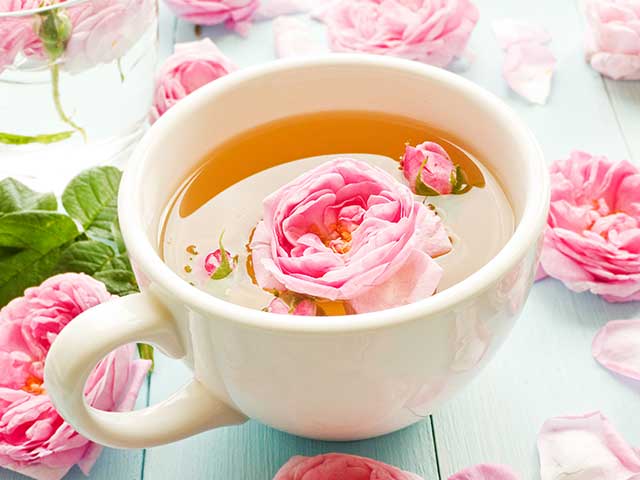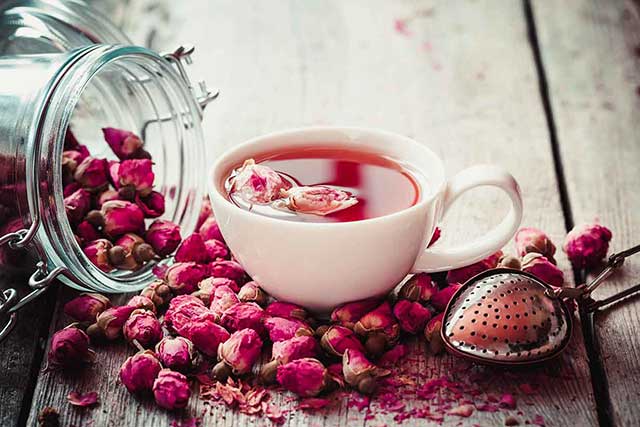Rose tea is a herbal tea with a fragrant and pleasant taste.
There are also many claims that the tea has substantial benefits, but is there evidence to support the claims?
Similar to many tea drinks, rose tea may offer some benefits, but these benefits are often wildly exaggerated.
In this article, we look into what rose tea is and provide an evidence-based guide to any potential benefits it may have.
What Is Rose Tea?
Rose tea is a herbal tea made from the whole dried petals and possibly flower buds of the rose flower, which is part of the Rosaceae family of plants (1).
We should also note that there are clear differences between rose tea and rosehip tea.
Rosehip tea uses dried rosehips, which are a type of accessory fruit that grows on the rose plant. Rosehips are unrelated to the rose flower (2).
In contrast, rose tea uses only the dried rose petals/buds.
Taste
Rose tea is enjoyable to drink, and it has a floral flavor which is almost similar to the way rose flowers smell.
While the taste of every tea is unique and challenging to describe, rose tea has a mildly sweet and fruity taste.
Unlike some herbal teas, the flavor is mild and delicate, and not at all strong or overpowering.
After drinking many different types of herbal tea, I would say that rose is one of the best for taste.
For more mild and delicate tea varieties, see this guide to honeybush.
Does Rose Tea Have Health Benefits?
As previously mentioned, there are many claims about rose tea having benefits. However, some of these have scientific backing and some do not.
Vitamin C
While many claims say that rose tea is high in vitamin C, this is difficult to verify.
There is a wide range of evidence to show that rosehip tea contains significant amounts of vitamin C (3, 4, 5).
However, as mentioned, rose tea and rosehip tea are entirely different drinks.
Unfortunately, there are no reliable references to suggest that rose tea provides meaningful amounts of vitamin C.
That said, like most plants, rose petals and rosebuds probably do contain some amount of the vitamin. Though without evidence, we cannot say with confidence how much a cup of rose tea would provide.
For those looking for vitamin C, rosehip and hibiscus tea are better options.
May Help With Menstrual Pain
Limited evidence suggests that rose tea may potentially help to ease menstrual cramps (dysmenorrhea) in young females.
Although there had been stories of rose tea helping ease menstrual symptoms as a folk remedy, no scientific studies had investigated this.
However, a randomized controlled trial featuring 130 female adolescents investigated the claims (6).
In this study, 70 participants were allocated rose tea, and the remaining 60 participants were given a placebo control.
Based on pre-interventional and post-interventional data (taken at 1, 3, and 6 months), the group consuming the rose tea experienced benefits.
To be specific, the intervention group perceived less menstrual pain, stress, and anxiety (6).
However, this single study appears to be the only research in the area, so there is only limited evidence.
Rose Tea Is Naturally Caffeine-Free
Many people love their morning coffee, and caffeine can have some positive effects on focus and energy levels (7).
However, caffeine is technically a drug, and like all drugs, it can have a range of side effects for some individuals (8).
For those who are looking for a caffeine-free hot drink to replace regular tea or coffee, rose tea is an excellent (and tasty) option.
With that being said, there are also several rose and black/green tea combination teas available to buy.
In other words, those who are looking for a non-caffeinated drink should opt for a 100% pure rose tea.
On this note, barley tea is another excellent caffeine-free option.
Rose Tea Is a Rich Source of Polyphenols
Polyphenols are bioactive compounds that plants contain.
Generally speaking, many people think of them as “antioxidants,” and we can find them in foods like berries, coffee, and red wine.
On this note, rose petals contain a range of different polyphenol classes, including flavonoids and tannins (9).
Some of the most concentrated polyphenolic compounds in rose tea include (10);
- Ellagic acid
- Ellagitannins
- Kaempferol
- Myricetin
- Quercetin
Polyphenols are thought to have benefits for human health, though the precise mechanisms are not fully understood yet (11).
Existing epidemiological research points toward a higher intake of polyphenols having anti-inflammatory and health-protective effects against chronic disease (12).

Unproven Benefits
There are also commonly repeated claims that rose tea may have the following benefits, which are currently unproven (13);
- Antibacterial activity
- Antidepressant benefits
- Antidiabetic properties
- Cardiovascular-protective properties
- Relaxation benefits
A research review summarizes the evidence for each of these potential benefits, but the truth is that these findings were not from simply drinking rose tea.
In reality, researchers demonstrated these benefits using high-strength extracts from rose flowers.
Furthermore, these high-strength compounds were tested in cell culture and rodent studies rather than on humans.
It is possible that drinking rose tea could, potentially, have some slight benefits in these areas.
However, there is currently no evidence from human clinical trials to suggest this is the case.
Are There Any Concerns About Rose Tea?
There do not appear to be any specific side effects of drinking rose tea.
Rare allergies to rose pollen have been reported nearby cultivation sites, but there appears to be no evidence of adverse effects from actual tea consumption (14).
How To Drink Rose Tea
Aside from actively collecting and drying rose petals, there are two main ways to drink rose tea.
Teabags
It is possible to buy rose tea teabags from most good tea stores.
We can use these in the same way as any other herbal tea; just put the teabags in a cup, add hot water, and leave to brew for 3-4 minutes.
Loose Dried Rose Petals/Buds
It is also possible to buy big bags of rose tea as loose dried petals.
In this case, all we need to do is add the dried petals to a cup/container and add hot water.
After brewing, some may wish to use a filter to remove the rose petals and buds.
One tablespoon of the dried petals is a typical amount to use, but everybody will have a different preference. The more you use, the stronger the flavor will be.
Final Thoughts
Rose tea is a flavorful and refreshing herbal tea, and it has an enjoyable taste.
While the tea may also offer some benefits, the evidence for these is somewhat lacking.
To put it another way; the best reason to drink the tea is the taste, and we should think of anything else as a bonus.
For more information on herbal tea, see this review of butterfly pea flower tea (also known as “blue tea”).
Related Articles
31 Types of Tea: Profiles, Potential Benefits, Side Effects
Honeybush Tea: a Guide (and Does It Have Benefits?)
Hibiscus Tea: What Health Benefits (and Risks) Does It Have?

